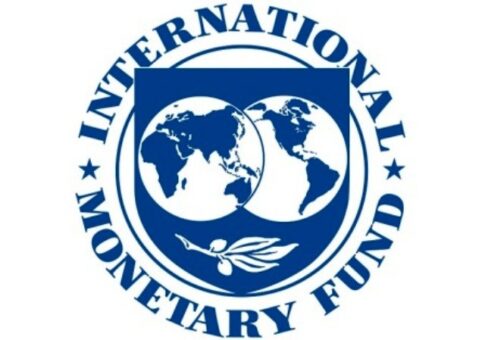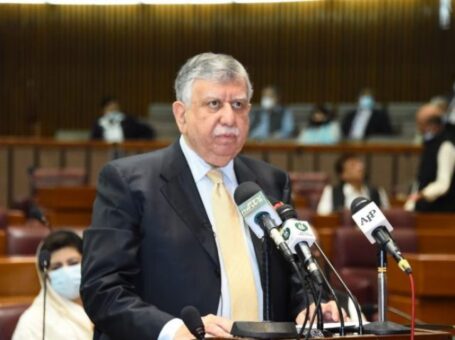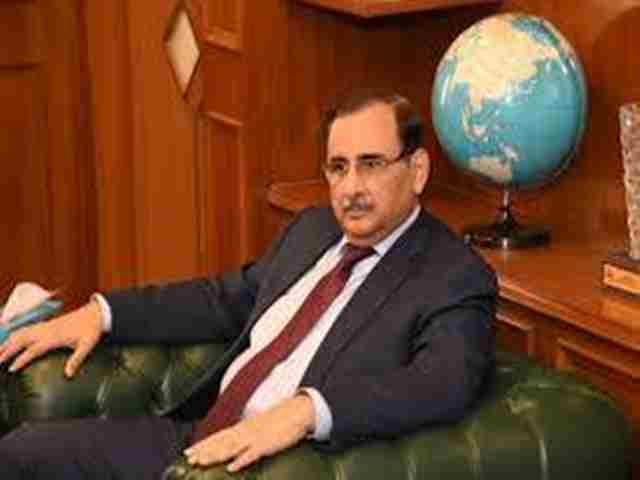ISLAMABAD: Pakistan and International Monetary Fund (IMF) likely to reach an understanding on the industry promotion package i.e. amnesty scheme in the ongoing 7th review, an official statement said on Thursday.
(more…)Tag: IMF
This tag provides stories related to IMF. Pakistan Revenue is committed to provide all updated related to IMF stories on Pakistan.
-

ABAD denounces IMF demand to stop incentives
KARACHI: Mohsin Sheikhani, Chairman Association of Builders and Developers of Pakistan (ABAD) has strongly denounced the demand of the International Monetary Fund (IMF) for ‘Unwinding’ the two key measures for the promotion of housing and construction activities and said that the suggestion of IMF will further weaken the economy of Pakistan.
In a statement on Tuesday, ABAD chairman said that according to a World Bank’s estimation for Pakistan, the real estate sector makes up 70 percent of the national wealth and this industry contributes significantly to the GDP.
READ MORE: ABAD demands abolishing regulatory duty on steel bars
The World Bank’s report itself speaks of the reality that how our national economy is dependent on real estate and construction industry, he said adding that finance has remained a serious issue for construction industry and if the demand of IMF is accepted by the government it will be the last nail in the coffin of Pakistan’s struggling economy.
He said that the present government of Imran Khan, foreseeing need of housing in Pakistan, had announced to build 5 million low cost houses during election campaign and after coming to power announced Amnesty Scheme for real estate and construction (also gave status of industry to construction) with the facilities of bank financing on special rates of housing. In view of World Bank’s report the facilities given for real estate and construction was a right step, he said.
READ MORE: FBR reviews tax incentives to construction industry
Chairman ABAD said that due to Covid 19 Pakistan’s economy has suffered in many ways but it does mean that the main support for the economy itself be uprooted. IMF has put forward this demand to the State Bank of Pakistan saying that wind down these measures “out of concerns for financial stability. Banks’ housing lending targets could present risks to financial stability”.
He said that this is ironic that World Bank accepts that real estate industry makes up 70 percent wealth and it contributes significantly to GDP. In the light of the World Bank’s report and need of housing the government should outrightly reject the demand of IMF and continue special measures for the real estate and construction industry because it is the fact that whenever any developed country faces recession, it gives top priority to construction industry to stabilize the economy.
READ MORE: Some obstacles challenging construction sector: PM
Moreover, governments all over the world facilitate their people to purchase first home through subsidies and finance and Pakistan is also a part of this world then why IMF is trying to deny the right of people to have their dream homes, he asked adding that in Pakistan slums or Kutchi Abadis are growing; specially in Karachi more than 54 people are forced to live in Katchi Abadis due to lack of financing is IMF wants Pakistan to become a Kutchi Abadi country?
However, if the government will succumb to IMF’s pressure in this matter, the economy of Pakistan will collapse and no one will be there for revival of national economy, he warned.
READ MORE: Ordinance notified to extend tax amnesty for construction sector
-

IMF board approves $1.059 billion tranche for Pakistan
ISLAMABAD: The Executive Board of the International Monetary Fund (IMF) on Wednesday approved sixth tranche under $6 billion Extended Fund Facility (EFF) for Pakistan.
Finance Minister Shaukat Tarin announced this in a Tweet. “I am pleased to announce that IMF Board has approved 6th tranche of their program for Pakistan.”
Pakistan will get around $1.059 billion after the IMF Board approval. The IMF on November 21, 2021 stated that its staff had completed the sixth review and the release of next tranche was subject to approval from the executive board, which was to be scheduled to meet on January 12, 2021.
READ MORE: IMF wants Pakistan to improve tax to GDP ratio to 20%
The IMF also linked the approval of the next tranche with certain conditions, including autonomy of State Bank of Pakistan (SBP) and withdrawal of tax exemptions to the tune of around Rs350 billion.
READ MORE: Pakistan to emerge as food surplus country: PM Imran
Pakistan had requested to extend the date for scheduled meeting of the IMF board up to January 28, 2022 and later it was further requested to extend up to February 02, 2022.
READ MORE: IMF intervention to add economic miseries of Pakistan
In meantime, the government presented and got approval the Finance (Supplementary) Act, 2022 and SBP Amendment Act to comply with the conditions of the IMF.
Analysts said that the transfer of latest IMF tranche would help the country to improve foreign exchange reserves besides it would also support the Pak Rupee (PKR).
READ MORE: SBP responds to misconceptions on amendments to State Bank Bill
-

IMF wants Pakistan to improve tax to GDP ratio to 20%
ISLAMABAD: Finance Minister Shaukat Tarin on Tuesday said the International Monetary Fund (IMF) wanted Pakistan to improve tax to GDP ratio to 20 per cent through structural changes.
Improving tax to GDP ratio to 20 per cent from 9 per cent is in the benefit of the country, he added.
Addressing to the interactive session with media persons along with Federal Minister for Energy Muhammad Hammad Azhar, Governor State Bank of Pakistan (SBP), Dr Reza Baqir, Minister for Information and Broadcasting, Fawad Hussain Chaudhry, State Minster for Information Farrukh Habib and Special Assistant to Prime Minister on health, Dr Faisal Sultan, he said that the existing tax to GDP ratio in the country was the lowest.
READ MORE: IMF intervention to add economic miseries of Pakistan
Tarin said, the IMF wanted Pakistan to collect additional taxes of Rs700 billion by eliminating various tax exemptions, however with negotiations with the team, the government was successful in convincing them of Rs343, hence declining the demand by Rs357 billion. The Minister said that out of this, Rs71 billion is taxed on luxury items of the rich.
He said that despite the IMF demands, the government did not enhance taxes on various items and also did not do away with some exemptions including pesticide, fertilizer, tractors, and provident fund and food and beverages items. Tarin said: “We also subsidized solar panel and other items and paid 100 per cent tax on laptops.”
“We have a Rs33 billion subsidy option that we can use as needed,” he said. The finance minister said that the government has given a tax exemption of about Rs350 billion which is not discussed anywhere.
READ MORE: SBP responds to misconceptions on amendments to State Bank Bill
He dispelled the misconceptions about the autonomy of State Bank of Pakistan (SBP). He said that even when the SBP is provided autonomy, all of its eight board members would be selected by the government, so there is no question of any compromise.
The minister said that the government wanted to give autonomy to the State Bank of Pakistan and it would not be like in the past when the government used to overdraft Rs7 trillion and insisted on printing currency notes. He said that a total of eight board members of SBP will be nominated and appointed by the government and: “We want to empower the central Bank board.”
Answering a question, he said that there is a market of Rs700 billion in the pharmaceuticals sector, but cosmetics and energy products made from this zero duty raw material of pharmaceutical allied will be taxed. “We have kept the exchange rate stable at Rs166,” he added.
The finance minister said that the government had stabilized the exchange rate, which he said was impacted by the situation in neighboring country, Afghanistan.
Governor State Bank of Pakistan (SBP), Dr Reza Baqir said that the decision of autonomy of any organization is made on its ownership and appointment there, and then in SBP this work is done by the government.
READ MORE: Key policy rate goes up to 9.75%; SBP raises 250bps in less than month
The SBP governor said that the interest rate in SBP is decided by the Monetary Policy Committee which is appointed by the government. He said that the Current Account Deficit (CoD) issue was more prevalent in the previous governments, which have been largely resolved by the present government.
Federal Minister for Energy, Muhammad Hammad Azhar, said that Pakistan has a gas problem in winter because of which gas reserves in Pakistan are depleting day by day, due to which there is gas shortage at the domestic and industrial level in the country.
The minister informed that no gas reserves have been discovered in the last few decades and: “We have delivered gas across the country which is primarily a matter of supply and demand.”
He said that earlier gas reservoir deletion was up to 9 percent but now it has increased to 25 percent.
Briefing the media persons on the flagship initiative of ‘Sehat Card’, Special Assistant to the Prime Minister on National Health Services, Regulations and Coordination Dr. Faisal Sultan said it was the physical manifestation of a compact done by the state with its citizenry for their well-being.
READ MORE: Pakistan to emerge as food surplus country: PM Imran
He said the health card, which provided health insurance worth Rs one million to each family per year, was now launched in Punjab after its successful implementation in Khyber Pakhtunkhwa. Initially, relatively poor people were covered, but the entire citizenry was included under the initiative after thorough analysis.
From January 1, 2022, he said all the citizens having Azad Jammu and Kashmir, Gilgit Baltistan, Islamabad, and Punjab as the permanent addresses on their Computerized National Identity Card had been entitled to the health card.
Highlighting contours of the initiative, he said every individual was being covered through his or her family head which had been explained in light of the policy of the National Database and Registration Authority (NADRA).
He said a wide range of diseases that needed admission to the hospital was being covered under the health cards.
The diseases included surgical and medical conditions, childbirth, dialysis, cancer and others Dr. Faisal said hospitals from both the private and public sectors were empaneled under the initiative, which would not only provide an opportunity to the government hospitals to improve their services by augmenting their budgets but also help the private sector to invest in far-flung areas.
A thorough analysis of the facility was being done on a regular basis to address any irregularity if found with its utilization, he said while responding to a query.
The SAPM said the sudden admission of a member of a family in hospital disrupted the household budget of almost every class including middle, lower-middle and others. The idea was to give health insurance to people to save them from such expenses.
Terming the Sehat Sahulat Scheme a ‘silent revolution’ in the health infrastructure of the country, he said watchful management of the initiative would make it a game-changer for the sector.
To another query, he said the initiative would not have any major impact on the public health budget.
Special counters had been set up in every empaneled hospital where a layman was being sensitized about the programme, he said while responding to another question.
-

IMF intervention to add economic miseries of Pakistan
Business leaders have raised serious concerns over the continuous intervention of the International Monetary Fund (IMF), warning that its influence is exacerbating Pakistan’s economic struggles.
(more…) -

FPCCI demands consultations on planned mini-budget
KARACHI: Federation of Pakistan Chambers of Commerce and Industry (FPCCI) on Thursday demanded the government of consultations with stakeholders on the planned mini-budget.
FPCCI President Mian Nasser Hyatt Maggo in a statement expressed his deep concerns over the approach of the government for not taking the apex business, industry, and trade body of Pakistan into the consultative process over mini-budget; and, what will it entail!
This effectively keeps all the stakeholders out of the loop, he added.
FPCCI President said that there are strong rumors that the government will also facilitate only the selected vested interests in the planned mini-budget next week. If all measures demanded by IMF are implemented, the people of Pakistan and the SMEs will have to endure an enormous burden of Rs. 800 billion, he added.
The FPCCI chief, referring to the announcement made by Finance Minister Shaukat Tarin, said that there is no way the current state of the economy can withstand an additional burden of Rs. 350 billion in taxes and the economy will collapse; and, the government would have to take the stakeholders into the consultative process to rekindle the process of economic growth after much damage.
Maggo said that the Finance Minister should immediately start the consultative process with FPCCI over the planned mini-budget. FPCCI has always kept the doors of the apex representative trade body of Pakistan open; but, the government has never paid any heed to the mutually-beneficial proposals we have put forward, he added.
The FPCCI chief said that the apex body had sent proposals on taxation reforms and broadening of the tax base, way back in February 2021; instead, the government has incompetently and insensitively has embarked on the path of tax pyramiding.
He reiterated that no more taxes can be extracted from the existing taxpayers. We should reach out to alternative multilateral financing sources and friendly countries for bilateral financing, he added.
-

IMF Board to approve $1.059bn by Jan 12, 2022: Tarin
ISLAMABAD: Shaukat Tarin, Adviser to Prime Minister on Finance and Revenue, on Monday said that staff-level agreement has been finalized and IMF executive board would approve the tranche by January 12, 2022.
The adviser said an agreement between Pakistan and International Monetary Funds (IMF) under Extended Fund Facility (EFF) worth $1.059 billion had been finalized.
The adviser said that Pakistan and IMF had reached the US$1.059 billion agreement up to staff level and now the agreement was in the executive board which would be approved by the board by January 12, 2022.
He said this while addressing to a press conference along with Minister for Energy Muhammad Hammad Azhar and Chairman Federal Board of Revenue (FBR) Dr Muhammad Ashfaq Ahmed.
Tarin said that after the signing of this agreement between Pakistan and the IMF, the door of economic cooperation would be opened for Pakistan in various international economic institutions including the World Bank and the Asian Development Bank.
As a result, there was potential for further improvement in the country’s economy in the future, he added.
He said that the conditions proposed by the IMF were Rs 700 billion in taxes but the government agreed to Rs 350 billion.
“We have saved fertilizers, food items and other things from taxes,” he said.
Replying to a question regarding Fiscal Consolidation, he said that along with savings in many places, the Public Sector Development Program (PSDP) would be reduced from Rs 900 billion to Rs 700 billion and some more steps would be taken.Apart from the agreement with the IMF, we have set a tax revenue target of 5.8 trillion, he said.
The government is optimistic about the tax revenue target as we are still seeing a 36 percent increase in tax revenue over the previous year, he added.
Tarin said that after this program, the government would adjust the fiscal discipline, including the State Bank of Pakistan Act.
He said that the government had agreed on some issues with the IMF in the previous review and some further discussions were held on it but due to the hard work of our economic team, this agreement was made possible.
He said that to maintain energy prices, fiscal discipline and tax revenue collection were very important for the government which was working on it.
He said that inflation was a global issue and it was due to the disruption of the global supply chain.
He said that the IMF had agreed on public finance reforms, tax reforms and simplification. The IMF had also agreed to provide targeted subsidies, as well as to continue reforms, he added.
Minister for Energy Hammad Azhar said that the International Monetary Fund (IMF) had acknowledged the government’s remarkable work in the energy sector as despite capacity payment, circular debt witnessed sharp decrease.
The minister said the base tariff was increased as per the agreement. There would be no effect on both Winter Seasonal Energy Package and Industrial Energy Package due to the agreement, he said.
Both the packages would continue as at Rs 12.96 per unit, he said. Hammad said prices of essential commodities witnessed sharp increases across the globe due to COVID-19 pandemic.
He said the entire negotiation team led by the Adviser on Finance Shaukat Tarin deserved appreciation. He said the agreement would bring further stability in the country’s economy.
-

IMF outlines actions for Pakistan to release $1.059bn
ISLAMABAD: The International Monetary Fund (IMF) on Monday outlined prior actions for Pakistan for the release f $1.059 billion under Extended Fund Facility (EFF).
The IMF stated that its mission led Ernesto Ramirez Rigo held virtual discussions during October 4–November 18, 2021 in the context of the sixth review of the authorities’ reform program supported by the IMF’s Extended Fund Facility (EFF).
The IMF said that it had reached a staff level agreement with the Pakistan authorities on policies and reforms needed to complete the sixth review under the EFF.
The agreement is subject to approval by the Executive Board, following the implementation of prior actions, notably on fiscal and institutional reforms.
Completion of the review would make available SDR 750 million (about US$1,059 million), bringing total disbursements under the EFF to about US$3,027 million and helping unlock significant funding from bilateral and multilateral partners.
An additional SDR 1,015.5 million (about US$1,386 million) was disbursed in April 2020 to help Pakistan address the economic impact of the COVID-19 shock.
Despite a difficult environment, progress continues to be made in the implementation of the EFF-supported program. All quantitative performance criteria (PCs) for end-June were met with wide margins, except for that on the primary budget deficit.
Notable achievements on the structural front include the finalization of the National Socio-Economic Registry (NSER) update, parliamentary adoption of the National Electric Power Regulatory Authority (NEPRA) Act Amendments, notification of all pending quarterly power tariff adjustments, and payment of the first tranche of outstanding arrears to independent power producers (IPPs) to unlock lower capacity payments fixed in renegotiated power purchase agreements (PPAs).
The authorities have also made progress in improving the anti-money laundering and combating the financing of terrorism (AML/CFT) framework, although some additional time is needed to strengthen its effectiveness.
On the macroeconomic front, available data suggests that a strong economic recovery has gained hold, benefiting from the authorities’ multifaceted policy response to the COVID-19 pandemic that has helped contain its human and macroeconomic ramifications.
The Federal Board of Revenue’s (FBR) tax revenue collection has been strong. At the same time, external pressures have started to emerge: a widening of the current account deficit and depreciation pressures on the exchange rate—mainly reflecting the compound effects of the stronger economic activity, an expansionary macroeconomic policy mix, and higher international commodity prices.
In response, the authorities have started to adjust policies, including by gradually unwinding COVID-related stimulus measures.
The State Bank of Pakistan (SBP) has also taken the right steps by starting to reverse the accommodative monetary policy stance, strengthening some macroprudential measures to contain consumer credit growth, and providing forward guidance.
In addition, the government plans to introduce a package of fiscal measures targeting a small reduction of the primary deficit with respect to last fiscal year based on: (i) high-quality revenue measures to make the tax system simpler and fairer (including through the adoption of reforms to the GST system); and (ii) prudent spending restraint, while fully protecting social spending.
These policies will help safeguard the positive near-term outlook, with growth projected to reach, or exceed, 4 percent in FY 2022 and 4.5 percent the fiscal year after that.
However, inflation remains high, although it should start to see a declining trend once the pass-through of rupee depreciation is absorbed, and temporary supply-side constraints and demand-side pressures dissipate.
However, the current account is expected to widen this fiscal year despite some export growth, reflecting the rising import demand and international commodity prices.
However, this economic outlook continues to face elevated domestic and external risks, while structural economic challenges persist.
In this regard, and looking beyond the near term, discussions also focused on policies to help Pakistan achieve sustainable and resilient growth to the benefit of all Pakistanis.
On the fiscal policy front, staying on course on achieving small primary surpluses remains critical to reduce high public debt and fiscal vulnerabilities. Continued efforts to broaden the tax base by removing remaining preferential tax treatments and exemptions will help generate much-needed resources to scale up critical social and development spending.
Monetary policy needs to remain focused on curbing inflation, preserving exchange rate flexibility, and strengthening international reserves.
As economic stability becomes entrenched and the independence of the SBP is strengthened with the approval of the SBP Act Amendments, the central bank should gradually advance the preparatory work to formally adopt an inflation targeting (IT) regime in the medium term, underpinned by a forward-looking and interest-rate-focused operational framework.
While some key elements of IT are already in place, including a medium-term inflation objective and prohibition of monetary financing, additional efforts are needed, to modernize the SBP’s operational framework as well as to strengthen monetary transmission and communication.
Advancing the strategy for the electricity sector reforms, agreed with international partners, is important to bring the sector to financial viability, and tackle its adverse spillovers on the budget, financial sector, and real economy. In this regard, steadfast implementation of the Circular Debt Management Plan (CDMP) will help guide the planned management improvements, cost reductions, timely alignment of tariffs with cost recovery levels, and better targeting of subsidies to the most vulnerable.
Substantially lowering supply costs, however, will require a modern electricity policy that: (i) ensures that PPAs do not impose a heavy burden on end-consumers; (ii) tackles the poor and expensive generation mix, including a wider use of renewables; and (iii) introduces more competition over the medium term.
Strengthening the medium-term outlook, including by unlocking sustainable and resilient growth, creating jobs, and improving social outcomes, hinges on ambitious efforts to remove structural impediments and facilitate the structural transformation of the economy. To this end, increased focus is needed on measures to strengthen economic productivity, investment, and private sector development, as well as to address the challenges posed by climate change:
Improving the governance, transparency, and efficiency of the state-owned enterprise (SOE) sector: Putting Pakistan’s public finances on a sustainable path—while leveling the playing field of firms across the economy and improving the provision of services—requires following through with the current reform agenda, especially with the: (i) creation of a modern legal framework; (ii) better sectoral oversight by the state, supported by regular audits, especially of the largest SOEs; and (iii) reduction of the footprint of the state in the economy, based on the recently completed comprehensive stocktaking.
Fostering the business environment, governance, and the control of corruption:The business climate would benefit from simplifying procedures for starting a business, approving FDI, preparing trade documentation, and paying taxes; and the empowerment of people and production of more complex goods from investing more in education and human capital. Ensuring a level playing field and the rule of law also remains essential, mainly by bolstering the effectiveness of existing anti-corruption institutions and accountability of high-level public officials and by completing the much-advanced action plan on AML/CFT.
Boosting competitiveness, and exports: To this end, key objectives include: (i) implementing the approved national tariff policy, based on time-bound strategic protection; (ii) negotiating new free trade agreements; and (iii) facilitating the integration in global supply chains by improving firms’ reliability and product quality, and registering firms with all necessary entities for tax and business purposes.
Promoting financial deepening and inclusion: To better channel savings toward productive investment, improve the allocation of resources, and diversify risks, key policies remain: (i) entrenching macroeconomic stability; (ii) strengthening institutional and regulatory frameworks; (iii) creating conditions that allow for a greater role of private credit; and (iv) boosting financial coverage of underserved segments of the population and SMEs.
Stepping up to climate change: Worldwide, Pakistan ranks both among the top 10 countries with the largest damages from climate-related disasters and top 20 countries with the largest greenhouse gas (GHG) emissions. Critical next climate policy steps are: (i) accelerating the finalization of the authorities’ National Adaptation Plan (NAP); and (ii) implementing an adequate set of measures to meet the COP26 Nationally Determined Contribution (NDC) targets and securing sufficient financing, including from international partners.
-

Miftah Ismail highlights key reasons behind rupee fall
Miftah Ismail, Former Federal Minister for Finance, has pointed out key reasons behind the massive depreciation in Pak Rupee (PKR) against the dollar.
Ismail, who is also General Secretary of PML-N Sindh, in his Tweet on Sundh pointed out a thread on the four main reasons for the recent precipitous decline in the value of the rupee.
A: Uncertainty about the renewal of the IMF program
B: Largest trade deficit and fastest-growing imports in history
C: Fourth highest inflation rates among major countries.
D: Rapid increase in the money supply.
Ismail explained that uncertainty about the renewal of the IMF program behind the rupee weakness.
The former finance minister said: “Our program was ‘revived’ earlier this year and we were supposed to get a $1 billion tranche in July 2021. We are now in November and still, there isn’t an agreement. This is giving markets jitters.”
In his opinion largest trade deficit and fastest-growing imports are the second major reason for the rupee fall.
“We are on track for imports of $75 billion or over 24 per cent of the GDP. Both these are the highest in history. This year exports will cover only 37 per cent of imports, down from 44 per cent in 2018. We are moving in the wrong direction.”
Our trade deficit in on track to be $47 billion or 15 per cent of the GDP. Again both numbers are highest in the history. Current account deficit will be around 5 per cent of the GDP. But for the healthy remittances due to decreased travel etc. we would have recorded the second-highest current account deficit
The former finance minister said that in our history, after the one of 8.1 per cent in 2007/2008, the last year of Gen. Musharraf. The increased net demand of dollars from foreign trade is thus putting pressure on the Pak rupee. “Until we slow down imports or increase exports, the rupee will continue to be under pressure.”
Another reason highlighted by the former finance minister is the highest inflation rates among major countries.
A recent issue of The Economist showed that Pak has the fourth-highest inflation among major counties, two of whom we don’t even have much trade with. “We also have the highest inflation in South Asia.”
Given that our inflation is more than our trading partners, our exports goods become more expensive and import goods become cheaper. This increases our real effective exchange rate and puts pressure on the rupee.
Miftah Ismail continued that our money supply has grown from Rs 4.7 trillion to Rs 7 trillion, an increase of 49 per cent.
Dr Hafeez Pasha estimates that a 1 per cent increase in money forces a 0.6 per cent rise in inflation. The primary cause of money supply increase is record-high government budget deficits.
“There are other reasons for the continuous devaluation, political uncertainty for one, but these four —-interlinked as they are— I think are the major reasons.”
Federal Minister for Energy Hammad Azhar in his tweet replied to Miftah Ismail saying: “I thought Miftah sahib was reminiscing about PML-N’s economy. Back then they managed to create such conditions without Covid shocks. The truth is that trade deficit now has risen due to price effect (same goods but more $ outflow due to high prices) rather than volume effect.”
-

Weekly Review: market to eye IMF package
KARACHI: The stock market to wait for the IMF package during the next week, which is current stalled. Analysts at Arif Habib Limited said that despite noise gaining traction on the economic front, they believe there is some silver lining; 1QFY22 fiscal deficit declined by 9.2 per cent YoY whereas local production also appears under control (auto sales went up by 49 per cent YoY and Fertilizer – Urea – offtake went up by 23 per cent YoY in October 2021).
(more…)